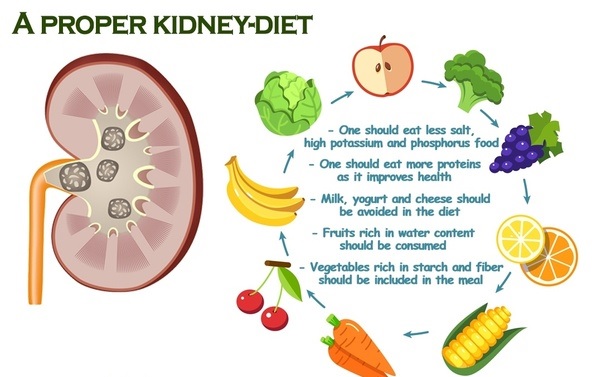
Establishing an adequate diet in the patient suffering from chronic renal failure is essential to achieve a correct nutritional status and consequently favor its rehabilitation.
Many of these patients are undergoing dialysis in Delhi.
Diet therapy in peritoneal dialysis
The peritoneal dialysis is a technique that allows extrarenal blood purification through the peritoneum (the serous membrane that covers the inside surface of the belly and forms several folds that wrap or support the abdominal viscera). It consists of the installation of a small tube in the abdomen through which a prepared liquid is introduced that must be allowed to act for a certain time (4-5 hours). This liquid is responsible for absorbing toxic waste substances and excess water. After the time this waste liquid is allowed to leave the body, explains nephrologist in Delhi.
Nutritional advice
- Patients undergoing peritoneal dialysis continuously, have a weight gain. This occurs because the patient receives a high amount of energy through dialysate (400-800 Kcal). Therefore the nephrologist in Gurgaon (the kidney specialist in Gurgaon), must determine the weight control in each patient.
- The liquid used to perform peritoneal dialysis can have a high concentration of glucose. It is estimated that 80% of this sugar is absorbed by the patient. This fact constitutes the first clue when establishing a diet. The carbohydrates (sugars) provided by the liquid are simple (fast absorption), for this reason in the diet should be supplied complex carbohydrates or slow absorption. These sugars are found in foods such as cereals, bread, pasta, rice, and legumes. On the other hand, if these foods are integral, they will introduce a significant amount of fiber into the diet.
- Peritoneal dialysis produces in the patients an important protein loss. This indicates that the intake of ingested proteins should be increased in a patient receiving this type of treatment. Regular but not excessive ingestion of meat, fish, eggs and dairy products is recommended by the best kidney specialist in Delhi.
- As for lipids, it is advisable to increase the consumption of monounsaturated fats and of vegetable and marine origin (olive oil, sunflower, corn, soybean… and bluefish)
- It must be checked periodically that the electrolyte balance remains constant. In some cases a restriction on sodium consumption is required, for this purpose foods such as ham, bacon, bacon, sausages, dried fish, seafood, frozen foods, packaged juices, white bread, milk, and its derivatives should be avoided. On other occasions it is necessary to reduce potassium intake, it will be advised to restrict the consumption of fruits and vegetables. You should always limit yourself in the consumption of products very rich in phosphorus (legumes, nuts, cheeses, milk, and dairy products).
- As long as the patient does not have edema, up to two liters of water can be ingested per day.
- The use of vitamin supplements is often recommended by top kidney specialist in Delhi.
Diet therapy in hemodialysis patients
The hemodialysis (or artificial kidney) is a dialysis technique consisting of extrarenal blood purification by hemodialyzers. The patient’s blood passes through a special filter by contacting a dialysis fluid that circulates through the same filter. Direct contact allows the release of toxic and waste substances and excess water into the dialysis fluid.
The diet of a patient undergoing hemodialysis should be supervised by a kidney specialist in Delhi. It is important to remember that despite the many restrictions, variety is allowed in the diet.
Foods advised against
- Fish in oil, smoked, offal, pates, black pudding, canned and concentrated fish and meat in cubes.
- Vegetables with high potassium content: zucchini, chard, spinach, watercress, Brussels sprouts, artichoke, celery, endive, escarole, carrot, leeks, peas, mushroom.
- All kinds of chocolates (because they contain high amounts of potassium), sweets, condensed milk, sauces.
- Pastries in general, crackers and sweets, chips and purees ready to prepare.
- Sauces, mayonnaise, butter, bacon, and cream. Do not abuse margarines and butters.
- Salt and sodium-rich foods. Nor is regimen salt recommended since it is rich in potassium.
- Banana, avocado, apricots, coconut, dates, figs, and dried plums.
- With caution: soft drinks, juices, almond milk, cider, broths and meat, and vegetable soups, for their contribution to mineral salts.
Milk and its derivatives are controversial foods in hemodialysis patients. On the one hand, caution must be taken because of its phosphorus contribution, which in patients with renal insufficiency cannot be eliminated by the kidney. But on the other, they are an important source of calcium, an essential mineral in bone composition. For these reasons, this food group must be very controlled. Generally, drug therapy is used to control the metabolism of these two minerals, explains kidney specialist in Noida.
Comments
You may use these HTML tags and attributes: <a href="" title=""> <abbr title=""> <acronym title=""> <b> <blockquote cite=""> <cite> <code> <del datetime=""> <em> <i> <q cite=""> <s> <strike> <strong>
Be the first to comment.